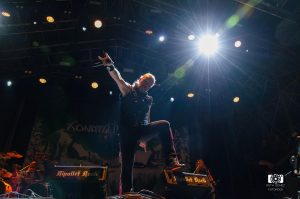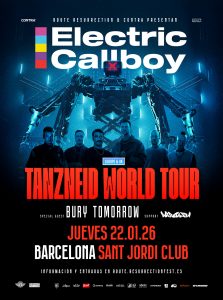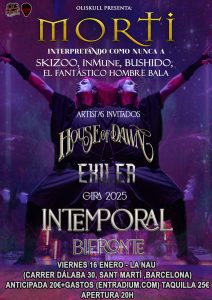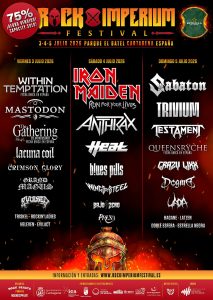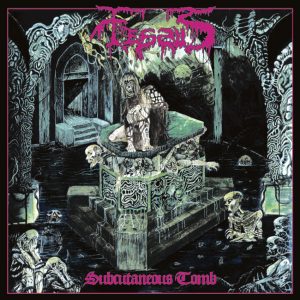CEMETERY FILTH: Forging Resilience in the Rot: Pushing Boundaries in Death Metal

Dive into the shadowy depths of creativity and defiance with our chat with Cemetery Filth. From navigating personal transformation to blending technical complexity with raw brutality, this interview offers a candid look at their creative process, profound themes of resilience and growth, and their commitment to crafting distinct, boundary-pushing death metal. Whether it’s their introspective songwriting, inspired by neurodivergence and empowerment, or their reinterpretation of Death’s iconic “Vacant Planets,” Cemetery Filth’s journey is one of evolution, grit, and an unrelenting pursuit of authenticity.
– Hi, first off thanks for taking your time. How’s everything doing in the lair of Cemetery Filth?
Hey! Thanks so much for thinking of us. The band is doing well, but keeping a low profile currently while we work on new material and reformulate a bit. Looking forward to getting back to playing shows as the Spring hits this year.
– With Senses of Detriment, you’re blending influences from classic death metal with progressive elements, nodding to bands like Death and Atheist. Could you talk about how you balance paying homage to the past while crafting a sound that pushes these boundaries forward?
Many thanks for the comparisons – we’re honored to be included in the same sentence as such bands! We have always tried to take the teachings of our influences and keep them conscious while still trying to do our own thing. The struggle to be original can be a bit challenging these days as the scene has exploded with tons of active death metal bands, all of which are pulling from a relatively small pool of influences from the past. Ultimately, Cemetery Filth aims to keep doing our own thing, focusing more on writing music that we like rather than trying to pander to any single influence, style, or trends. We are especially excited to be writing new material, as we are always trying to write things that challenge us as musicians and push us forward technically and creatively.
– You’ve been described as having a raw, visceral energy, particularly on tracks like “Cyclocognition.” Do you feel that the gritty production and technical complexity on this EP mirror any underlying themes of resilience, transformation, or defiance? How do you hope listeners interpret this sonic evolution?
The music definitely mirrors the themes of the music, and who we are as artists. There’s a lot of negativity, uncertainty, and distraction in this world that we have to navigate through, but we maintain that we have to keep fighting to live life as freely as possible, and we certainly expect the music to push past expectations, limitations, and what’s been done already.
We hope our listeners hear our growth, hear the underlying message of hope and empowerment, and hope that they embrace it to better themselves and their communities. Ultimately, we are all in this together, and we are all one in the same.
– Since Senses of Detriment took shape amid a world of shifting norms and new challenges, does the EP embody or reflect any personal experiences from recent years, especially as they relate to navigating change or staying true to yourselves in a rapidly changing music scene?
Senses of Detriment does relate to personal experiences but I’ve tried to relay them lyrically to be applicable to anyone.
“Intrepid Ways” is a song about self-empowerment. Facing your inner fears, untangling them by focusing on what’s holding you back, embracing your truth, and pushing forward as a newly healed and whole being. I am a transwoman but this song is not specific to my experience, and more about just being the best human being that one can be. Everyone has changes to make. So many of us hold ourselves back from embracing change or improvements because we live in fear or are locked in trauma. We can all work through these things, heal them, and walk forward stronger so that we cannot only live more freely but also interact with the world around us more genuinely.
“Cyclocognition” is a song about discovering you’re neurodivergent, something I only recently found about myself, which has really brought much awareness and understanding. It’s about learning how to master your mind and understand how you best work in this world when most education systems and society expect our minds to operate and learn in an unrealistic one-dimensional manner.
– Your music has a profound sense of place—originally rooted in Tennessee, now in Atlanta. How has this shift influenced your sound or the themes you explore? Do you feel that each place has contributed different aspects to Cemetery Filth’s identity?
I don’t know if our location has influenced the band as much as the members involved in the different eras of the band have. When we started the band in Tennessee, I was driving nearly two hours over the mountains from North Carolina. At the start, we weren’t as confident in our musical skills and just wanted to write good riffs, fun songs, and something that showed our love for the music we grew up worshipping.
As the band moved to Atlanta, a few of the Tennessee members still continued with us and we gradually wanted to start pushing ourselves musically; often writing music that we couldn’t quite play when written. This challenged us to get to where we could play those songs cleanly, and allowed us to grow as a band, slowly bettering each other with every new song we wrote.
I am now the only original member, but my co-bandleader and drummer, Tristan Payne, has been an invaluable addition to the band and thinks about music very similarly. We want to keep pushing ourselves and doing things that are not only fun for us, but challenge us to become better musicians and push the boundaries of the genre. I am endlessly thankful for finding Tristan and feel more confident with him in this band than I ever have.
– The EP’s composition highlights precise, complex rhythm and riff shifts. Did any of these musical decisions come from collaborative experimentation within the band? How does each member’s influence or style contribute to the intricate dynamics we hear on the record?
We are all into the more progressive and technical side of things. And we always were despite the bands’ earlier material being a little simpler. It’s just now that we’re gaining the musical skills to really start doing all of the weird stuff we’ve heard in our minds. I typically write most of the music, these days and now that Tristan is in the band, he plays a big part in helping formulate ideas by contributing great drum ideas and helping me arrange songs.
– Including a cover of Death’s “Vacant Planets” is a bold choice, especially given Death’s profound impact on the genre. What drew you to this particular song, and how do you feel it aligns with the themes and sound of Senses of Detriment? Did reinterpreting this track offer new insights or inspiration for your own work?
I’ve always really loved that song. Human was the first death metal album I ever heard when I was 14, and while my young ears couldn’t immediately process what I was hearing, I was always drawn back to it. “Vacant Planets” eventually became a favorite song because I interpreted it to be a warning about environmental destruction, as well as reaching for the stars.
Additionally, a dear friend of mine who met Chuck Schuldiner discussed this song with him on the Death tour bus in ’95 and that story always made it seem like a song that really deserved more attention. It’s often overshadowed by the more popular songs on that album.
– Thematically, Senses of Detriment seems to explore resilience, darkness, and evolution. What message or feeling do you hope lingers with listeners after they experience this EP? How do you hope they connect with these darker narratives?
The overall statement of this release is to let the past rot away (hence the decomposing cover art), and continue growing. There’s a lot in this world that will try to hold you back, but you have to push forward and inherently be the best you that you can be. Not to repeat myself too much, but that truly is how you stay distinct and feed your artistic spirit. I hope people walk away from our music with a desire to be stronger and to grow unchallenged.
– And before we wrap this interview up, what are now your near-future plans?
Cemetery Filth are currently writing material for our second full-length. We are not putting a timeframe on it as we like to “let the metal flow” as it does. Nothing good is ever forced. We are planning a small US tour for later this year and hoping to get some more opportunities rolling as 2025 rolls onward.
– That’s all from our side. Thanks again for answering to these questions. If you’d like to add some final words; it’s your turn.
Many thanks for choosing us to interview, and our deepest thanks to any and all who take a moment to check out our music or read this article. I hope you all find inner strength, allow healing, and push forward to be your best positive self.
Be well and Keep the Metal Faith alive and Filthy!

